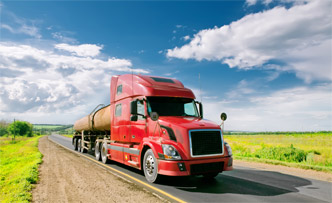
American truckers haul millions of items, worth billions of dollars, on interstate highways each day. You strive to deliver these loads safely to their destinations. In the majority of cases, that is just what will happen. But, what if an accident occurs? More specifically, what if a spill occurs? Who will have to pay to clean up trucking accident spills?
Trucking insurance might be able to help you cover many of the costs that a trucking spill might cause. That’s because, given that trucks often carry hazardous materials, the operators need to be able to cover the costs of recovery when accidents might occur. Let’s take a closer look at this topic.
Commercial Auto and Motor Truck Cargo Insurance
Every driver has a lot to lose when they get behind the wheel. Truckers are no exceptions. That’s why they need insurance, both for their driving risks and the risks that face their business operations in general. Most truckers need at least commercial auto coverage and motor truck cargo insurance.
- Commercial auto insurance: This is the general term for auto insurance that covers drivers who operate for business purposes. Private auto insurance won’t cover most business drivers, and certainly won’t extend to truckers. Truckers will need a specific trucking insurance policy, a more-specific type of commercial auto insurance. It will cover the trucker in cases where accidents or other vehicle damage force them to have to pay for recovery costs.
- Motor truck cargo insurance: Alongside standard commercial vehicle insurance elements, truckers will also need this coverage. This is a type of inland marine insurance, which insures items in transport on public roadways. It applies to losses that might occur that involve the truck’s cargo, such as theft, damage or loss of the items in accidents.
In many cases, you will need these coverage elements to apply to your truck. First, policies will provide you with compensation to deal with costly losses that might result from trucking wrecks or other occurrences. Second, truckers, their vehicles and cargo usually face a variety of insurance requirements. Policies must meet regulations set by your state of residence and by federal law.
The reason many authorities require truckers to carry cargo insurance is because a loss of cargo isn’t only a loss to the trucker. It is also a loss to the consumer who expects to take possession of the items.
But, an additional threat is what might happen when accidents occur should this cargo spill. If it does, then someone will have to clean it up. If the cargo were to be one that might prove hazardous to others, or polluting to the local environment, then the responsibility might become even more critical. That’s why you’ll want to make sure your policy can help you cover the cleanup of these items.
Pollution Cleanup and Debris Removal Insurance
You don’t want a trucking accident to happen. However, if it does, you might have to spring into action. The spill or loss of your cargo merits immediate action. With your commercial auto and motor truck cargo insurance, you can usually have assistance available in case spills occur.
- Debris removal insurance: Truckers who carry any type of materials might benefit from this coverage. Should these items come loose and spill into the surrounding area, then this coverage can help you pay for the cleanup costs.
- Pollution cleanup insurance: This coverage can help you pay to cleanup hazardous materials spilled in wrecks or other trucking accidents. For example, if you haul fertilizer, gas, hazardous waste and other potentially-harmful materials, then this coverage can pay for cleanup if a wreck ruptures your tank.
So, for example, say that your truck overturns in windy conditions on an interstate. If your truck carries materials like food stocks or many other items, then debris removal coverage can pay to help you remove the items spilled in the roadway and clean up the mess.
Pollution insurance might apply in more-specific scenarios where a hazardous substances spills from the truck. So, if your paint truck spills its content onto other vehicles, or into the surrounding environment, coverage can pay for the cleanup.
These policies are often very similar. Besides just paying for cleanup, they might pay other costs like lawsuit settlements, regulatory fees and more. That way, the business can weather the storm of accidents and spills in a financially-secure way. Keep in mind, when this damage occurs, you will want to make sure your policy also compensates clients who sustain a property loss because of the cargo damage.
You will need to choose the appropriate trucking coverage limits that will address your operating needs at all times. Our agents are experts in this field, and we are more than happy to help our clients select the policy that will effectively address their needs whenever they get behind the wheel.